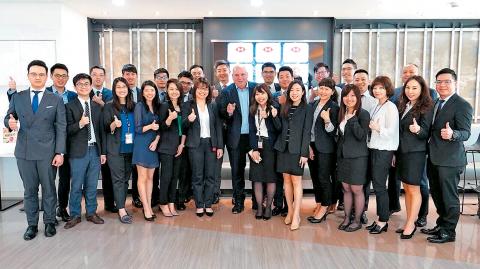HSBC Holdings PLC said that the company is well-positioned for strong growth across all business lines in Taiwan this year, in particular its retail banking and wealth management (RBWM) offerings.
Taiwan remains among the 8 priority RBWM markets in the Asia Pacific for the company and service enhancements are set to be rolled out following digital transformation investments of US$1.7 billion, the company said, adding that it is committed to further commitments for further development.
The company is focusing its digital initiatives that would benefit customers and meet their needs, Kevin Martin, head of Asia Pacific retail banking and wealth management at HSBC.

“We aim to respond to our customers and bring control back to their end, and the best way to do so is by adopting digital and mobile services,” Martin said.
“Customers enjoy having full control of their time and the ability to meet their banking needs without the limitation of business hours and branch visits,” Martin said.
Last year, HSBC’s RBWM businesses in Taiwan posted record-setting pretax profits of US$43 million, and part of that achievement is due to a shift away from its growth-centric focus, and instead adopting a new incentive system that tracks performance wholistically, Martin said.

Instead of setting specific product targets, the company’s relationship managers now focus more on growing with customers, leading to less attrition, Martin said, adding that the shift is the culmination of a transition that had taken place in the past 3 to 4 years
He is also upbeat that expectations of higher interest rates would lend growth in the Asia Pacific’s RBWM market, in particular in Taiwan and other markets with rapidly aging populations.
The company’s latest digital initiatives in Taiwan include the launching of Google Pay in January, while Samsung Pay and Apple Pay are expected to be launched before the end of the first half to round out its payments offerings for customers.
Streamlining the credit card approval process has been one of the company’s priorities, said HSBC Bank (Taiwan) head of retail banking and wealth management(葉清玉) said.
Last month, the company launched a new feature that allows customers to apply for HSBC credit cards with any existing credit card that is issued by a list of 19 Taiwanese banks, Yip said, noting that the prerequisite covers about 67 percent of active credit cards in Taiwan, and cuts down the time required to validate customers’ identities to just a few seconds.
Another innovation is a new tablet application that has empowered the company’s insurance relationship managers by allowing them to display pre-filled customer data forms to reduce errors, and increase efficiency of the insurance sales journey, Yip said, adding that customers’ insurance needs are also more accurately gauged with the application’s checking mechanism.

CAUTIOUS RECOVERY: While the manufacturing sector returned to growth amid the US-China trade truce, firms remain wary as uncertainty clouds the outlook, the CIER said The local manufacturing sector returned to expansion last month, as the official purchasing managers’ index (PMI) rose 2.1 points to 51.0, driven by a temporary easing in US-China trade tensions, the Chung-Hua Institution for Economic Research (CIER, 中華經濟研究院) said yesterday. The PMI gauges the health of the manufacturing industry, with readings above 50 indicating expansion and those below 50 signaling contraction. “Firms are not as pessimistic as they were in April, but they remain far from optimistic,” CIER president Lien Hsien-ming (連賢明) said at a news conference. The full impact of US tariff decisions is unlikely to become clear until later this month

GROWING CONCERN: Some senior Trump administration officials opposed the UAE expansion over fears that another TSMC project could jeopardize its US investment Taiwan Semiconductor Manufacturing Co (TSMC, 台積電) is evaluating building an advanced production facility in the United Arab Emirates (UAE) and has discussed the possibility with officials in US President Donald Trump’s administration, people familiar with the matter said, in a potentially major bet on the Middle East that would only come to fruition with Washington’s approval. The company has had multiple meetings in the past few months with US Special Envoy to the Middle East Steve Witkoff and officials from MGX, an influential investment vehicle overseen by the UAE president’s brother, the people said. The conversations are a continuation of talks that

CHIP DUTIES: TSMC said it voiced its concerns to Washington about tariffs, telling the US commerce department that it wants ‘fair treatment’ to protect its competitiveness Taiwan Semiconductor Manufacturing Co (TSMC, 台積電) yesterday reiterated robust business prospects for this year as strong artificial intelligence (AI) chip demand from Nvidia Corp and other customers would absorb the impacts of US tariffs. “The impact of tariffs would be indirect, as the custom tax is the importers’ responsibility, not the exporters,” TSMC chairman and chief executive officer C.C. Wei (魏哲家) said at the chipmaker’s annual shareholders’ meeting in Hsinchu City. TSMC’s business could be affected if people become reluctant to buy electronics due to inflated prices, Wei said. In addition, the chipmaker has voiced its concern to the US Department of Commerce

STILL LOADED: Last year’s richest person, Quanta Computer Inc chairman Barry Lam, dropped to second place despite an 8 percent increase in his wealth to US$12.6 billion Staff writer, with CNA Daniel Tsai (蔡明忠) and Richard Tsai (蔡明興), the brothers who run Fubon Group (富邦集團), topped the Forbes list of Taiwan’s 50 richest people this year, released on Wednesday in New York. The magazine said that a stronger New Taiwan dollar pushed the combined wealth of Taiwan’s 50 richest people up 13 percent, from US$174 billion to US$197 billion, with 36 of the people on the list seeing their wealth increase. That came as Taiwan’s economy grew 4.6 percent last year, its fastest pace in three years, driven by the strong performance of the semiconductor industry, the magazine said. The Tsai